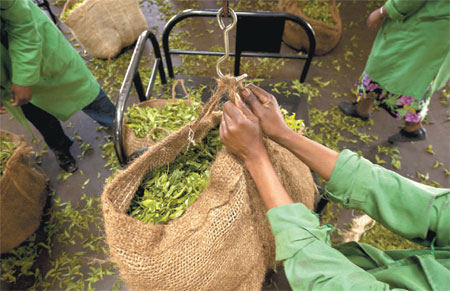Mars to set up food safety center
|
Workers processing tea products for Mars Inc. The company said it aims to source 100 percent of its black tea from certified sources by 2015. Provided to China Daily |
New facility in Beijing to lead R&D, quality efforts of global manufacturer
Leading food manufacturer Mars Inc, whose brands include M&M and Dove, is building a global food safety center in China to help further expand knowledge and understanding of effective global food safety management.
Scheduled to open in the summer of 2015 in Huairou, a suburb of Beijing, the $15 million center will be the first of its kind for Mars and one of the first facilities of its kind for the region and the industry, with the purpose of conducting non-profit food safety research and training.
"We are developing this center to focus on horizon scanning, researching new threats, developing new methods, and building capability through education and training," according to Mars.
The goals are to develop enabling science that can be translated into more robust and cost effective food safety and quality systems, to drive continuous improvement throughout the Mars supply networks.
The center also aims to develop an external global network of universities and research institutions to enhance their ability to adapt to new challenges and opportunities, as well as to provide laboratory and technical facilities to regulators and researchers.
The center will be open to internal and external audiences to enable networking and to support standard development and contribute where appropriate to government food safety systems.
Mars began selling products in China in the 1930s and formally established its operations in 1989, and now has seven factories, three research and development centers, and five business segments: Wrigleys, petcare, chocolate, Mars Food and Drink, and Royal Canin. It also has 47 offices and sales branches.
The company exports products manufactured in the Chinese mainland to other markets in Asia including Japan, South Korea, and Hong Kong.
"The center in Beijing is one of the examples where we see sustainability not just as a cost but as an investment," said Kevin Rabinovitch, global sustainability director for Mars.
"We know that supply chain disruptions and food safety issues - beyond being a concern to consumers, first and foremost - also represent a business risk to us. We and everyone else benefit from having a safer food supply chain, so it makes good business sense to invest in things like the food safety center - not just for us but to improve the overall climate of food safety."
Rabinovitch said food safety and sustainability are actually connected.
"If we use resources to produce food from a food crop - but then somehow in the supply chain the safety of that food crop is harmed and it is no longer safe to eat or safe to use then all the resources that went into producing that food were wasted. A focus on food safety is a great way to make sure that the things that get produced actually make it to the consumer in a healthy, safe, quality product," he said.
Mars published its fourth annual Principles in Action Summary at the end of July, which details the company's approach to business - the challenges it shares with society, and its commitment to put the Mars Five Principles -- quality, responsibility, mutuality, efficiency and freedom -- into action.
The Principles in Action Summary covered areas of the business such as supply chain, operations, brands, health and wellness.
The three biggest initiatives rolled out by Mars included the building of the Mesquite Creek wind farm in Texas, which will generate energy from renewable sources equivalent to the electricity requirements of their entire operations in the United States. Privately-owned Mars aims to eliminate all fossil fuel energy use and greenhouse gas emissions from its direct operations by 2040.
The second commitment is to train 150,000 cocoa farmers in West Africa Mars -- now the world's largest purchaser of cocoa from certified sources - increased its purchase of certified cocoa to 30 percent of total volumes towards its goal of 100 percent certified cocoa by 2020.
wangzhuoqiong@chinadaily.com.cn

























